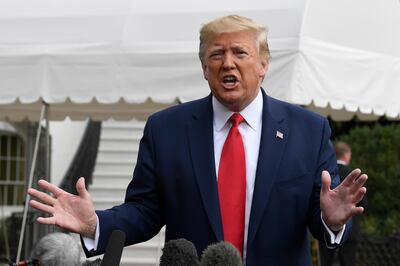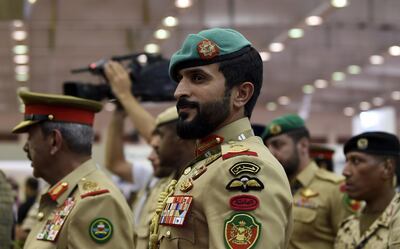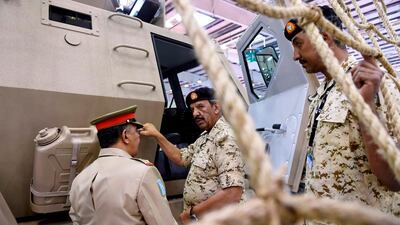When US President Donald Trump declares that he wants to end America's involvement in the “bloodstained sand” of the Middle East – as he has done repeatedly in recent weeks – he seems to be overlooking a fundamental point: the US is directly involved in a dangerous stand-off with Iran.
The reason that Washington now finds itself in a bitter dispute with Tehran over Iran’s nuclear ambitions cannot be blamed on the Arab world, even though most Middle Eastern governments – especially in the Gulf – were opposed to the deal negotiated during the Barack Obama presidency in 2015. A new era of US confrontation with Iran is down to Mr Trump’s unilateral decision last year to withdraw from the nuclear deal by which the regime in Tehran agreed to reduce its proliferation activities in return for the lifting of sanctions.
Mr Trump has always regarded the agreement as "the worst deal ever" and withdrew US involvement in an attempt to persuade Tehran to renegotiate the deal to cover other aspects of Iran's nuclear programme, as well as its interference in the rest of the Middle East. And while getting a new deal remains the Trump administration's primary objective, the most palpable manifestation of renewed tensions between the two countries has been a significant escalation in tensions in the Gulf region, which is a crisis entirely of the US president's making – no matter how much he might like to reduce America's involvement in the region.

Consequently, Washington has a moral obligation to protect its allies from the significant threat Iran poses, one that not even the quixotic Mr Trump can ignore. And when Mr Trump reiterates that his intention is to reduce America's military presence from the region – as he did earlier this week following the elimination of ISIS leader Abu Bakr Al Baghdadi in north-western Syria – it sends a troubling signal to the Gulf states that find themselves directly in the line of fire in any US-Iran confrontation.
Concerns from Gulf leaders over mixed signals coming out of Washington were in evidence at this week’s BIDEC defence conference in Bahrain, where much of the focus of visiting delegations was regarding how the Gulf states can be better prepared to deal with any threat to their security. During the conference, which attracted a global audience of delegates, attention was directed to an array of new technologies that could enhance the ability of Gulf states to better protect themselves against the sophisticated methods being used by Iran to threaten its neighbours, such as drones and cyber attacks.
There is a vital need for the Gulf states to dramatically increase their defensive measures in the wake of recent attacks in the region, such as September's carefully-orchestrated attack on Saudi Arabia's Aramco facility which succeeded in briefly reducing Saudi production by a third, and prompted a brief spike in oil prices. None of the delegates at the conference were under any illusion that the ultimate responsibility for the attack lies with Iran, even though Tehran has repeatedly denied involvement. Moreover, the effect of the attack has been to persuade Gulf leaders to be more attentive to the region's defence needs, especially in view of Mr Trump's less-than-reassuring attitude.
The prevailing attitude among Gulf leaders was best summed up this week by Sheikh Nasser bin Hamad, Bahrain’s dynamic national security adviser, who reiterated that aggression against Saudi Arabia would be deemed to be an attack on all the Gulf states. He stressed the importance of confronting countries like Iran, which sponsored terrorist groups and posed a threat to global maritime trade.

The willingness of Gulf states to accept more responsibility for protecting their interests will certainly play well at the White House, which has repeatedly called on Arab governments to do more on defence issues, rather than habitually relying on the US. Yet while there is a willingness on the part of Gulf leaders to invest in state-of-the-art technologies to deter threats, questions about the level of Mr Trump's commitment run the risk of undermining their attempts to provide enhanced stability. For example, his bombastic style of leadership has had a negative impact on Washington's efforts to establish a global maritime force to safeguard merchant shipping in the Gulf, especially in the Strait of Hormuz – the focus of Iranian attempts to disrupt global trade.
A number of countries, particularly in Europe, have been reluctant to join the International Maritime Security Construct, or IMSC, over concerns about the way Mr Trump conducts US policy, as well as their reservations over withdrawing from the Iranian nuclear deal. Consequently a number of countries, such as Germany, France, Japan, India and South Korea, which have expressed an interest in helping to protect Gulf shipping, are reluctant to join the IMSC over concerns about operating in a coalition controlled by the White House. Countries have instead, offered their services to the Combined Maritime Force, or CMF – an organisation committed to protecting global shipping, rather than concentrating specifically on the Gulf.
While this arrangement allows the likes of Brazil – which announced its decision to work with the CMF this month – can assist with protecting Gulf shipping, it is another example of the negative impact Mr Trump’s erratic conduct is having on the long-term security interests of America’s allies in the Gulf.
Con Coughlin is the Telegraph’s defence and foreign affairs editor


